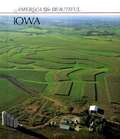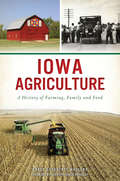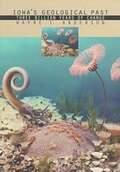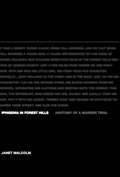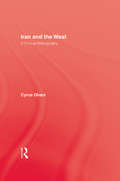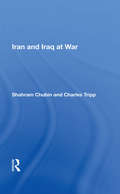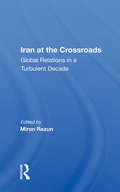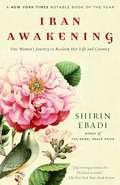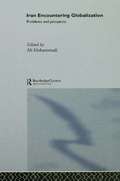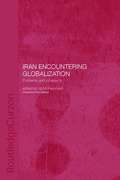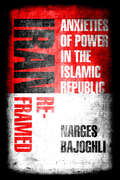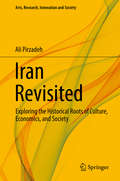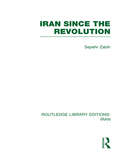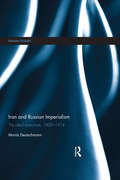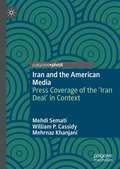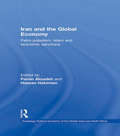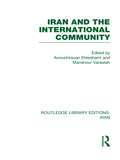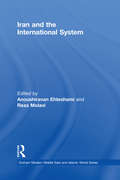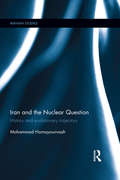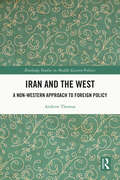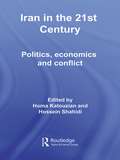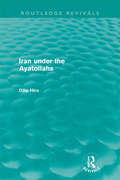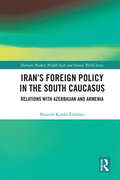- Table View
- List View
Iowa (America The Beautiful)
by Deborah KentAmerica is beautiful because its land and people are so varied ... 50 proud states, plus the District of Columbia and Puerto Rico ... each with its own history and heroes, landforms, and life-style. And now each has its own story told, its people profiled, its greatness celebrated, in one of the 52 volumes comprising America the Beautiful. The material covered corresponds to social studies curricula for grades 5 through 8. However, with their crisp, clear writing ... breathtaking, full-color graphics ... and wealth of factual material, logically organized to invite easy reference ... these books are completely suitable for students from grade 4 through high school. In every book of America the Beautiful, the engagingly written text covers the geography, history, government, economy, arts, and recreation of the state, concluding with an exciting "tour" of significant sights. Then comes the remarkably complete reference section, usually over 30 pages and designed in a way that allows students to find easily the information they are looking for.
Iowa Agriculture: A History of Farming, Family and Food (American Palate)
by Darcy Dougherty MaulsbyThe Tall Corn State's agricultural history influences countless aspects of modern life. To truly understand Iowa, you have to understand the culture of agriculture--the stories of the people of the land. In many ways, these are untold stories, especially as more generations of families are further removed from living or working on Iowa farms. Visitors from around the globe travel to Iowa annually for major events like the Farm Progress Show, the World Pork Expo and the World Food Prize. Agriculture has shaped Iowa's landscape from the location of towns and the evolution of the world-famous Iowa State Fair to Iowa's beloved culinary traditions like breaded pork tenderloins, sweet corn and more. Join fifth-generation Iowa farmer Darcy Dougherty Maulsby as she details the fascinating history of agriculture in Iowa.
Iowa's Geological Past: Three Billion Years Of Change (Bur Oak Bks.)
by Wayne I. AndersonAn illustrated survey of the geological history of the state of Iowa, from the Precambrian through to the end of the Great Ice Age, written by Professor of Geology at the University of Northern Iowa.
Iphigenia in Forest Hills
by Janet Malcolm"Astringent and absorbing. . . Iphigenia in Forest Hillscasts, from its first pages, a genuine spell -- the kind of spell to which Ms. Malcolm's admirers (and I am one) have become addicted. " --Dwight Garner,New York Times "She couldn't have done it and she must have done it. " This is the enigma at the heart of Janet Malcolm's riveting new book about a murder trial in the insular Bukharan-Jewish community of Forest Hills, Queens, that captured national attention. The defendant, Mazoltuv Borukhova, a beautiful young physician, is accused of hiring an assassin to kill her estranged husband, Daniel Malakov, a respected orthodontist, in the presence of their four-year old child. The prosecutor calls it an act of vengeance: just weeks before Malakov was killed in cold blood, he was given custody of Michelle for inexplicable reasons. It is the "Dickensian ordeal" of Borukhova's innocent child that drives Malcolm's inquiry. With the intellectual and emotional precision for which she is known, Malcolm looks at the trial--"a contest between competing narratives"--from every conceivable angle. It is the chasm between our ideals of justice and the human factors that influence every trial--from divergent lawyering abilities to the nature of jury selection, the malleability of evidence, and the disposition of the judge--that is perhaps most striking. Surely one of the most keenly observed trial books ever written,Iphigenia in Forest Hillsis ultimately about character and "reasonable doubt. " As Jeffrey Rosen writes, it is "as suspenseful and exciting as a detective story, with all the moral and intellectual interest of a great novel. " "Iphigenia in Forest Hillsis another dazzling triumph from Janet Malcolm. Here, as always, Malcolm's work inspires the best kind of disquiet in a reader--the obligation to think. " --Jeffrey Toobin, author ofThe Nine: Inside the Secret World of the Supreme Court "A remarkable achievement that ranks with Malcolm's greatest books. Her scrupulous reporting and interviews with protagonists on both sides of the trial make her own narrative as suspenseful and exciting as a detective story, with all the moral and intellectual interest of a great novel. " --Jeffrey Rosen, author ofThe Supreme Court: The Personalities and Rivalries that Defined America
Ipperwash
by Edward J. HedicanOn September 6, 1995, Dudley George was shot by Ontario Provincial Police officer Kenneth Deane. He died shortly after midnight the next day. George had been participating in a protest over land claims in Ipperwash Provincial Park, which had been expropriated from the native Ojibwe after the Second World War. A confrontation erupted between members of the Stoney Point and Kettle Point Bands and officers of the OPP's Emergency Response Team, which had been instructed to use necessary force to disband the protest by Premier Mike Harris's government. George's death and the grievous mishandling of the protest led to the 2007 Ipperwash Inquiry.Edward J. Hedican's Ipperwash provides an incisive examination of protest and dissent within the context of land claims disputes and Aboriginal rights. Hedican investigates how racism and government practices have affected Aboriginal resistance to policies, especially those that have resulted in the loss of Aboriginal lands and led to persistent socio-economic problems in Native communities. He offers a number of specific solutions and policy recommendations on how Aboriginal protests can be resolved using mediation and dispute management - instead of the coercive force used in Ipperwash Park that ultimately gave this tragic story such infamy.
Iran & The West: A Critical Bibliography
by Ghani"First Published in 1987, Routledge is an imprint of Taylor & Francis, an informa company."
Iran And Iraq At War
by Shahram ChubinThis book attempts to understand both the nature and the consequences of the current conflict between Iraq and Iran. It is based on a research project initiated by the auspices of the Programme for Strategic and International Security Studies in Geneva.
Iran At The Crossroads: Global Relations In A Turbulent Decade
by Miron RezunThe chapters in this book were written by me or solicited from renowned experts to produce a work that anticipated an imminent post- Khomeini period in Iranian history. The first draft was not ready until June 1989, practically coinciding with the death of Khomeini and the tenth anniversary of the Iranian Revolution-an important milestone after a decade of turmoil. The book you are about to read took some time to put together. Based on extensive research, the project was undertaken in early 1988 and ended about the spring of 1990. A sincere debt of gratitude is naturally owed to all of my contributors. But the preparation of any book does not take place in a financial void. My gratitude is especially extended to the academic vice-president of my university, Dr. Robert Burridge, for granting me the seed money from the university's Development Fund. Substantial financial assistance to cover the bulk of the logistical expenses was offered by the Canadian Institute of International Peace and Security in Ottawa and by the Social Sciences and Humanities Research Council of Canada through its program of aid to scholarly conferences.
Iran Awakening: One Woman's Journey to Reclaim Her Life and Country
by Azadeh Moaveni Shirin EbadiThe moving, inspiring memoir of one of the great women of our times, Shirin Ebadi, winner of the 2003 Nobel Peace Prize and advocate for the oppressed, whose spirit has remained strong in the face of political persecution and despite the challenges she has faced raising a family while pursuing her work. Best known in this country as the lawyer working tirelessly on behalf of Canadian photojournalist, Zara Kazemi -- raped, tortured and murdered in Iran -- Dr. Ebadi offers us a vivid picture of the struggles of one woman against the system. The book movingly chronicles her childhood in a loving, untraditional family, her upbringing before the Revolution in 1979 that toppled the Shah, her marriage and her religious faith, as well as her life as a mother and lawyer battling an oppressive regime in the courts while bringing up her girls at home. Outspoken, controversial, Shirin Ebadi is one of the most fascinating women today. She rose quickly to become the first female judge in the country; but when the religious authorities declared women unfit to serve as judges she was demoted to clerk in the courtroom she had once presided over. She eventually fought her way back as a human rights lawyer, defending women and children in politically charged cases that most lawyers were afraid to represent. She has been arrested and been the target of assassination, but through it all has spoken out with quiet bravery on behalf of the victims of injustice and discrimination and become a powerful voice for change, almost universally embraced as a hero. Her memoir is a gripping story -- a must-read for anyone interested in Zara Kazemi's case, in the life of a remarkable woman, or in understanding the political and religious upheaval in our world.
Iran Encountering Globalization: Problems and Prospects
by Ali MohammadiWith new material and up-to-date information, this book examines the current state of Iran, exploring a wide range of areas including the economy, finance, politics, the media, and the position of women and migration. Iran Encountering Globalization discusses the uneasy balance between the theocratic conservatism, modernization and globalization. This is a key tension in Iran - one which has arisen following the revolution of 1979, since the regime has worked to Islamicize the country, while at the same time international globalization forces have been pulling in a different direction. Concluding that forces for change in Iran are currently building up, this is an extremely topical book that makes an important contribution to current debates surrounding democracy in Iran.
Iran Encountering Globalization: Problems and Prospects
by Ali MohammadiThis text examines the current state of Iran, looking at a wide range of areas including the economy, finance, politics, the media, the position of women and migration. The book discusses the uneasy balance between the theocratic conservatism, modernisation and globalization, concluding that forces for change in Iran are building up.
Iran Reframed: Anxieties of Power in the Islamic Republic (Stanford Studies in Middle Eastern and Islamic Societies and Cultures)
by Narges BajoghliAn inside look at what it means to be pro-regime in Iran, and the debates around the future of the Islamic Republic. More than half of Iran's citizens were not alive at the time of the 1979 Revolution. Now entering its fifth decade in power, the Iranian regime faces the paradox of any successful revolution: how to transmit the commitments of its political project to the next generation. New media ventures supported by the Islamic Republic attempt to win the hearts and minds of younger Iranians. Yet members of this new generation—whether dissidents or fundamentalists—are increasingly skeptical of these efforts. Iran Reframed offers unprecedented access to those who wield power in Iran as they debate and define the future of the Republic. Over ten years, Narges Bajoghli met with men in Iran's Revolutionary Guard, Ansar Hezbollah, and Basij paramilitary organizations to investigate how their media producers developed strategies to court Iranian youth. Readers come to know these men—what the regime means to them and their anxieties about the future of their revolutionary project. Contestation over how to define the regime underlies all their efforts to communicate with the public. This book offers a multilayered story about what it means to be pro-regime in the Islamic Republic, challenging everything we think we know about Iran and revolution.
Iran Revisited
by Ali PirzadehThis book examines Modern Iran through an interdisciplinary analysis of its cultural norms, history and institutional environment. The goal is to underline strengths and weaknesses of Iranian society as a whole, and to illustrate less prescriptive explanations for the way Iran is seen through a lens of persistent collective conduct rather than erratic historical occurrences. Throughout its history, Iran has been subject to many studies, all of which have diagnosed the country's problem and prescribed solutions based on certain theoretical grounds. This book intends to look inward, seeking cultural explanations for Iran's perpetual inability to improve its society. The theme in this book is based on the eloquent words of Nasir Khusrau, a great Iranian poet: "az mast ki bar mast". The words are from a poem describing a self-adoring eagle that sees its life abruptly ended by an arrow winged with its own feathers--the bird is doomed by its own vanity. The closest interpretation of this idiom in Western Christian culture is "you reap what you sow", which conveys a similar message that underlines one's responsibility in the sense that, sooner or later, we must face the choices we make. This would enable us to confront - and live up to - what Iran's history and culture have taught us.
Iran Since the Revolution (Routledge Library Editions: Iran)
by Sepehr ZabirSince the turn of the century Iran has experienced three major political upheavals in the struggle to democratize her political systems. The last revolution inaugurated an era of unprecedented turmoil and instead of fulfilling its democratic aim, paved the way for an even more despotic theocracy. To put the revolution in a proper perspective, some attempt is made to explain the reasons for Khomeini’s success in acquiring first, the symbolic leadership of the anti-Shah revolution, and then, the monopolistic control of power in Iran. How and why the other claimants to power were shunted aside and later brutally repressed is a further theme for discussion. The domestic and external ramifications of the revolution are examined in detail; in particular the rise of the anti-American feeling which culminated in the hostage crisis. In conclusion, an analysis is offered of the instrumentalities of power available to the Islamic Republic, and several scenarios are explored in which Iran’s competing forces may converge to determine whether this third revolution will finally succeed in subordinating political authority to popular democratic consent.
Iran Under the Pahlavi Monarchy: Essays in Iranian History, Politics, Culture and Literature (Iranian Studies)
by Homa KatouzianBringing together eighteen essays from Homa Katouzian, this book explores Iranian history, politics, culture and Persian literature from mediaeval times through the nineteenth century and into the contemporary period.Beginning with an overview of mediaeval Iranian history, the book then considers developments in the nineteenth century leading to the Constitutional Revolution of 1906-1911, which resulted in the fall of the Qajar dynasty (1785-1925). This is followed by a comprehensive overview of the Pahlavi monarchy (1925-1979) and a new and original analysis of the Iranian Revolution of February 1979. The book also includes essays on modern and classical Persian literature, encompassing Persian poetry and politics (1919-1925), the hitherto unstudied humour in Sadeq Hedayat’s life and works, a critical study of Forugh Farrokhzad, a study of Persian literary devices with special reference to the great Persian classic Sa‘di, and a study of Sa‘di as a lover of beauty and advocate of human morality.The book analyses Iran in a way that has seldom been done in one single volume – the history of the Qajar and Pahlavi dynasties, the two great revolutions in the twentieth century, and the unfamiliar nature of state and society in Iranian history, as well as some of the high points in modern and classical Persian literature – and is vital reading for anyone interested in the Middle East.
Iran and Russian Imperialism: The Ideal Anarchists, 1800-1914 (Iranian Studies)
by Moritz DeutschmannRather than a centralized state, Iran in the nineteenth century was a delicate balance between tribal groups, urban merchant communities, religious elites, and an autocratic monarchy. While Russia gained an increasingly dominant political role in Iran over the course of this century, Russian influence was often challenged by banditry on the roads, riots in the cities, and the seeming arbitrariness of the Shah. Iran and Russian Imperialism develops a comprehensive picture of Russia’s historical entanglements with one of its most important neighbours in Asia. It recounts how the Russian Empire strived to gain political influence at the Persian court, promote Russian trade, and secure the enormous southern borders of the empire. Using hitherto often neglected documents from archives in Russia and Georgia and reading them against the grain, this book reveals the complex reactions of different groups in Iranian society to Russian imperialism. As it turns out, the Iranians were, in the words of the Russian orientalist Konstantin Smirnov, "ideal anarchists," whose resistance to imperial domination, as well as to centralized state institutions more generally, impacted developments in the region in the century to come. Iran’s troubled relationship with the wider world continues to be a topic of considerable interest to historians, yet little focus has been given to Russia’s historical connections to Iran. This book thus represents a valuable contribution to Iranian and Russian History, as well as International Relations.
Iran and the American Media: Press Coverage of the ‘Iran Deal’ in Context
by William P. Cassidy Mehdi Semati Mehrnaz KhanjaniThis book investigates the American media coverage of the historic nuclear accord between the Islamic Republic of Iran and the world powers, commonly known as the Iran Deal. The analysis examines the sources of news and opinion expressed about the Iran Deal in The New York Times, The Washington Post and the national newscast of broadcast networks. The empirical component uses media sociology and indexing theory to determine the extent to which the media covered the topic within a framework of institutional debates among congressional leaders, the executive branch and other governmental sources. The coverage is placed within a larger historical and interpretative framework that examines the construction of Iran in both the pre-revolution news narratives and in the post-revolution American media and popular culture. The book endeavors to reveal the place Iran occupies in the American political and cultural imagination.
Iran and the Global Economy: Petro Populism, Islam and Economic Sanctions (Routledge Political Economy of the Middle East and North Africa)
by Parvin Alizadeh Hassan HakimianThe relationship between religion and the state has entered a new phase ever since the Iranian Revolution more than three decades ago. The recent mass uprisings against autocratic rulers in the Arab world have highlighted the potency of Islamist forces in post-revolutionary societies in the region, a force arguably unlocked first by Iran’s version of the ‘spring’ three decades ago. The economic ramifications of these uprisings are of special interest at a time when the possibility of the creation of Islamic states can have implications for their economic policy and performance again. A study of the Iranian experience in itself can offer rare insights whether for its own features and characteristics or for its possible lessons and implications for recent events in the region. This book is concerned with the economic aspects and consequences of the Iranian Revolution in general and its interaction with the international economy in particular. Many studies have to date dealt with Iran’s economic challenges, policies and performance in the post-revolutionary period but its interaction with the international economy – although of growing importance – has not received sufficient attention. The contributions in this volume by experts in the field address ways in which in the span of three decades, Iran’s economy has evolved from a strong aspiration to develop an ‘independent economy’ to grappling with debilitating international economic sanctions.
Iran and the International Community (Routledge Library Editions: Iran)
by Anoush EhteshamiIn this book experts examine the main features of Iran’s foreign policy from 1980 – 1990, assessing relations with the UN, the superpowers, Europe, the GCC and Iraq. Although the Islamic revolution made Iran a significant force in the international arena, it is argued that the ending of the Cold War and the rise of Iraq as the dominant power in the Gulf are now creating a very different set of foreign policy challenges and options.
Iran and the International System (Durham Modern Middle East and Islamic World Series)
by Anoushiravan Ehteshami Reza MolaviMuch attention in the West has focused on Iran as a problem country. This book challenges the representations of Iran as a hostile regional power led by ideologues, and goes further by discussing how international relations are viewed from inside Iran itself, outlining the factors which underpin Iranian thinking on international relations and considering what role Iran, as a large and significant country in the Middle East, ought to play in a fairly constructed international system. The book is written by leading scholars and policy makers from inside, as well as from outside, Iran and includes academics with unparalleled access and insights into the world-views of the Iranian leadership. Subjects covered include: the rationale of Iran's Islamic constitution, including its electoral system, and the impact this has on international relations; Iran's view of the ideal international system, including the place therein of ethics, justice, and security; Iran's international interests, including energy needs; and relations with the West, including the clash between Iranian and Western views of the world order.
Iran and the Nuclear Question: History and Evolutionary Trajectory (Iranian Studies)
by Mohammad HomayounvashSpanning over a period of more than five decades since its inception, Iran’s nuclear programme is the most protracted civilian nuclear program in the world and one of the most politicized projects in Iran’s history. 'Iran and the Nuclear Question' offers a historiographical portrait of Iran’s early nuclear program under Mohammad Reza Shah Pahlavi. Using declassified archival material, the book thematically chronicles the program’s genesis, evolutionary trajectory, and devolution from the 1950s through to the 1970s. It also catalogues the Revolutionary Iran’s early socialization into the atom and the Islamic Republic’s gradual change of heart about nuclear energy that culminated in the incremental resuscitation of the Shah’s nuclear enterprise in the 1980s. As the first archive-based account of one of the most long-lasting and capital-intensive nuclear enterprises during the Cold War, ‘Iran and the Nuclear Question’ is a valuable resource for students and scholars of Iranian, Middle East and Security Studies. Written in a clear and accessible format, it will also appeal to those with a more general interest in Iran and its nuclear journey.
Iran and the West: A Non-Western Approach to Foreign Policy (Routledge Studies in Middle Eastern Politics)
by Andrew ThomasThis book explores non-Western approaches to foreign policy in the context of Iran in order to encourage wider consideration of non-Western scholarship in international relations.Throughout its existence IR has drawn primarily on Western thought and experience, leaving other perspectives on the periphery of discourse. As the field becomes more about contexts beyond the West, this has become a challenge for creating a truly ‘global’ field of study. Concepts like ‘national interest,’ ‘rationality’ and ‘pragmatism’ are often applied to Iran without considering what these concepts mean in the context of Iranian political identity. The aim of this book is to highlight the contemporary relevance of native Iranian and non-Western perspectives to IR analysis, returning complexity and critique to Iranian studies. To do this, the author examines four of Iran’s political encounters with the West, including its resistance to sanctions policy and negotiations surrounding its nuclear program. Ultimately, the book argues that ignoring Iranian motivations of identity has routinely resulted in missed opportunities, growing tensions and failed coercive policy.The book will prove valuable reading for students and researchers interested in international relations theory, Iranian history and Middle East studies.
Iran in the 21st Century: Politics, Economics & Conflict (Iranian Studies)
by Homa Katouzian Hossein ShahidiIran is an ancient country, an oil-exporting economy and an Islamic Republic. It experienced two full-scale revolutions in the twentieth century, the latter of which had large and important regional and international consequences, including an eight-year war with Saddam Hussein’s Iraq. And now in the twenty-first century, it confronts issues and experiences problems which have important implications for its future development and external relations. Featuring outstanding contributions from leading sociologists, social anthropologists, political scientists and economists in the field of Iranian studies, this book is the first to examine Iran and its position in the contemporary world. In developing this argument, topics examined include: social developments in the country including gender relations contemporary politics international relations relations with the US and Israel nuclear weapons and energy programmes oil and the development of the economy.
Iran under the Ayatollahs (Routledge Revivals)
by Dilip HiroFirst published in 1985, this is a comprehensive study of the Middle East's most strategic country, set against the background of the Islamic heritage of Iran and the rise and fall of the Pahlavi dynasty. Dilip Hiro describes the various phases through which the Islamic revolution has passed, gives an incisive account of the first Gulf War, and provides an historical survey of Iran's relations with the West, the Soviet bloc, and other countries of the region.
Iran's Foreign Policy in the South Caucasus: Relations with Azerbaijan and Armenia (Durham Modern Middle East and Islamic World Series)
by Marzieh Kouhi-EsfahaniIran’s role as a regional power is more significant than many in the West may realise. The country lies between Central Asia/the Caucasus and the Gulf region on the one hand, and, on the other, between the Mediterranean/Levant region and South Asia. Many of these areas are of increasing strategic importance. This book explores Iran’s role as a regional power, focusing on relations with South Caucasus countries - Azerbaijan and Armenia. It outlines the historical context, including Persia’s rule of these countries before the nineteenth century, and discusses Iran’s approach to foreign and regional policy and how both internal and international factors shape these policies. The book assesses Iran–Azerbaijan and Iran–Armenia bilateral relations to demonstrate how those policies translate in Iran's regional and bilateral relations. The book concludes by considering how Iran's relations in the region are likely to develop in the future.
